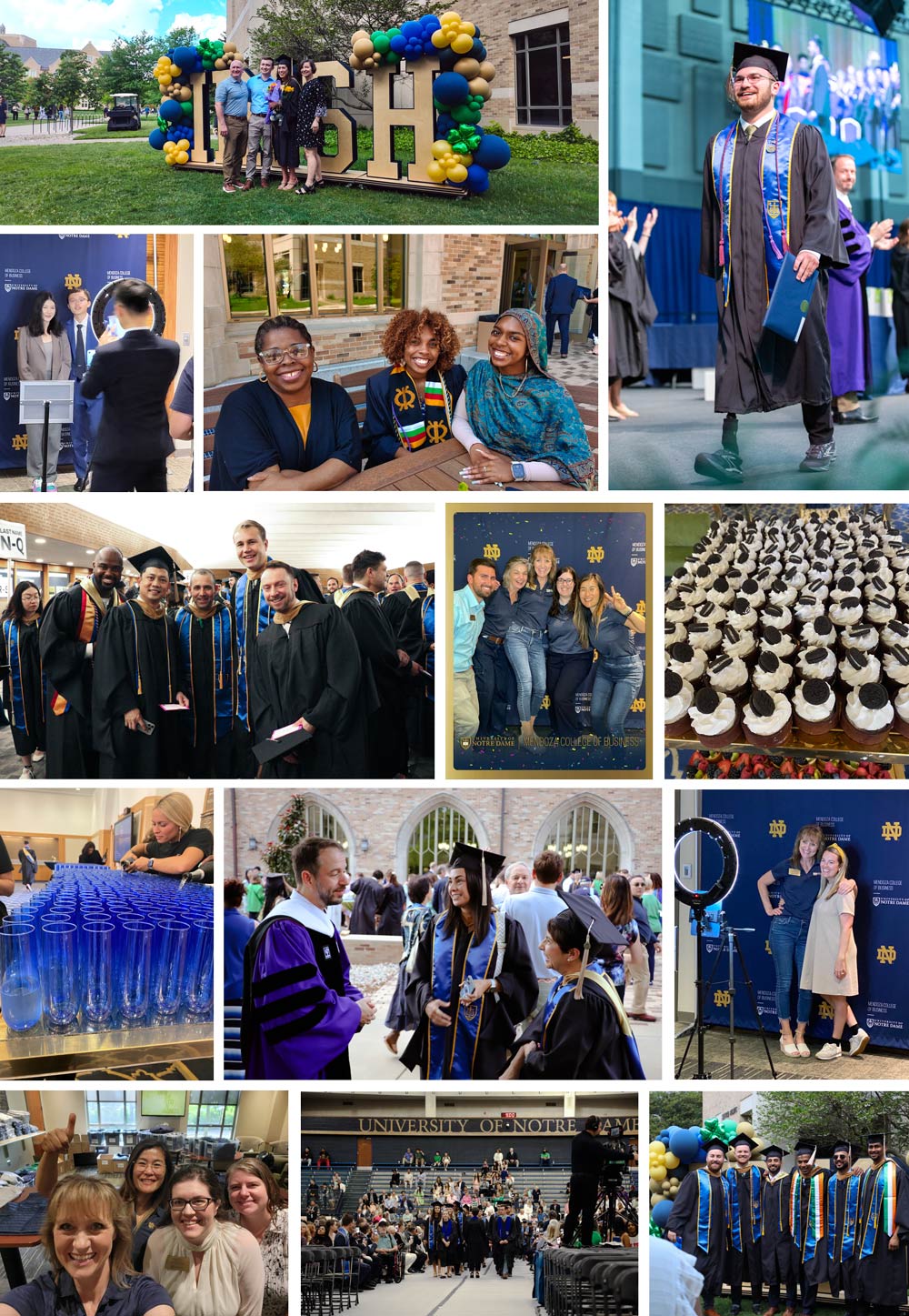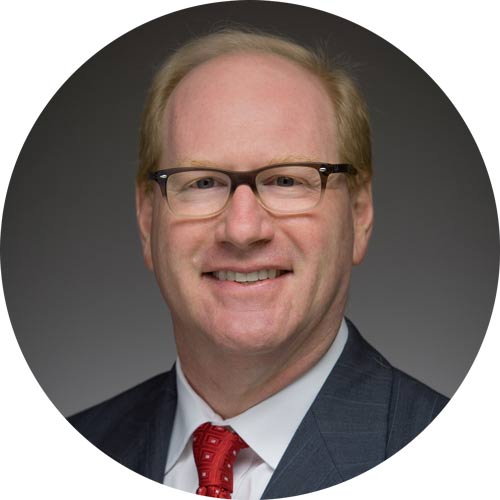What a wonderful commencement weekend, from the sunny weather and the beautiful ceremonies, to seeing graduates with their families celebrate this important occasion in their lives.
The weekend brought a number of special moments, including Father John’s farewell address and a rousing performance by the High Kings.
During the Graduate Diploma Ceremony, we had a very literal illustration of the Notre Dame family. We celebrated a mother-daughter graduation as Denise Wright received her Executive MNA while daughter Kelley Wright earned her MBA. And two other MBA grads, Roger Loesch Jr. and David Sobek, graduated with the same degree as their fathers 38 years later! (Both named after their fathers, as well!)
During the Undergraduate Diploma Ceremony, Andrew Daigneau, who nearly lost his life in a motorcycle accident about two years ago, fulfilled his goal of walking the stage with his classmates to receive his degree on time. (He also had a special cover made for his prosthesis with real gold from the dome regild!) The applause was thunderous as he received his diploma.
Both Mendoza ceremonies were grand, meaningful and very well executed, and represented the spirit of service of our faculty and staff. (Watch the Undergraduate recap video here and the Graduate recap video here!)
They also took an army of faculty and staff volunteers. I am thankful to the many of you who played a part in the success — some with public roles, some behind the scenes. My special thanks to the following:
Undergraduate Commencement Committee and Volunteers: Katherine Alan, Brandy Babcock, Tammy Bilotta, Deb Coch, Mary Coghlin, Carol Elliott, Nick Farmer, Claire Fitzgibbon, Kari Friestad, Laura Glassford, Ron Grisoli, Ashley Heberling, Lisa Heming, Helen High, Rachel Karnafel, Helen Keefe, Rob Kelly, Tabitha Kingsbury, Santhosh Lakkaraju, Shane McCoy, Minhee Myung, Maggie Neenan-Michel, Jessica Noffsinger, Kara Palmer, Dana Pierce, Amy Radvansky, Amanda Rink, Emily Sharp, Gina Shropshire, Jessica Tezich, Tess Tullman, Charissa Warne, Kyle Way, Andrew Wendelborn and Barbara Westra.
Graduate Programs Commencement Committee: Teresa True, Christine Gramhofer, Cathi Kennedy, Sherry Nadai, Regan Nadai, Chad DeWeese, Samantha Crisp, Meghan Huff and Zoe Bonnichsen.
Graduate Programs Commencement Volunteers: Angela Sienko, Annette Tysver, Bill Schenher, Brandy Babcock, Cassie Kline, Cassie Smith, Christopher Fruehwirth, Claire Fitzgibbon, Crystal Boser, Dana Pierce, Dave Grundy, Diego Wang, Emily Marrese, Hermalena Powell, Jessica Stookey, Jodi Campbell, Katherine Alan, Kim Brumbaugh, Kyle Way, Lisa Michaels, Michael Mueller, Nadia Ewing, Nick Farmer, Nicole Velasquez, Phil Drendall, Richard Yoo, Santosh Lakkaraju, Shane McCoy, Sherry Nadai, Stephanie Brown, Stephanie Drudge, Suzanne Witt, Tabitha Kingsbury, Tahra Taylor, Tim Cichos, Tracey Plenzler, Tracy Kulwicki, Vasilisa Mikhailova, Zach Stabrowski, Megan Huff, Wendy Walker, Shelley Arredondo-Rice, Joseph Torma and Connie Varga.
Video and Photography Support: Lauren Slygh, Lucas Eggers and Carol Elliott.
Swag Sale Volunteers: Chris Grenert, Carol Elliott, Zara Osterman, Minhee Myung, Stephanie Brown, Rebecca Wood, Shane McCoy, Dave Grundy, Phil Drendall, Nick Farmer, Jen Wade, Barb Westra, Chad DeWeese, Dana Pierce, Vasilisa Mikhailova, Hank Gettinger and Santhosh Lakkaraju.

Below is more information about the two diploma ceremonies and a list of the teaching awards bestowed by the University, the College, the academic departments and the degree programs.
My sincere gratitude to all as we closed out another successful academic year!
In Notre Dame,
Martijn
-------
UNDERGRADUATE STUDIES
A total of 594 undergraduates received their diplomas:
- Accountancy: 61
- Business Analytics: 126
- Business Technology: 3
- Finance: 300
- Management Consulting: 50
- Marketing: 54
UNIVERSITY TEACHING AWARD
Rev. Edmund P. Joyce, C.S.C., Awards for Excellence in Teaching: Mitch Olsen, Richard J. Huether Associate Teaching Professor of Marketing
COLLEGE LEVEL - UNDERGRADUATE AWARDS
Joe and Gina Prochaska Family Teaching Award: Robert Lewandowski, Associate Teaching Professor of ITAO
ACADEMIC DEPARTMENT TEACHING AWARDS
Accountancy
- James Dincolo Outstanding Professor Award: John Donovan, Gerspach Family Associate Professor of Accountancy
- James Dincolo Outstanding Research Award: Andrew Imdieke, Associate Professor of Accountancy
- James Dincolo Outstanding Teaching Award: Sandra Vera-Muñoz, Associate Professor of Accountancy
- James Dincolo Outstanding Teaching Award: Tonia Hap Murphy, Teaching Professor of Accountancy
- James Dincolo Outstanding Service Award: Tim Morrison, Associate Teaching Professor, and Fred Mittelstaedt, KPMG Collegiate Professor of Accountancy
Finance
- Outstanding Undergraduate Professor Award: Walt Clements, Teaching Professor of Finance
- James Dincolo Outstanding Research Award: Ben Golez, Associate Professor of Finance
- Prochaska Outstanding Teaching Award: Sophie Shive, Associate Professor of Finance
- Department of Finance Outstanding Teaching Award: Margaret Forster, Teaching Professor of Finance
- Department of Finance Distinguished Service Award: Katherine Spiess, Associate Professor of Finance
IT, Analytics, and Operations
- Zachary Plantz Outstanding Undergraduate Teaching Award: Sharif Nijim, Assistant Teaching Professor of ITAO
- Outstanding Research Award: Nicholas Berente, Professor of ITAO
- Prochaska Family Teaching Award: Yoon Seock Son, Assistant Professor of ITAO
- Outstanding Teaching Professor Award: Jennifer Waddell, Teaching Professor of ITAO
- ITAO Department Faculty Service Award: Corey Angst, Jack and Joan McGraw Family Collegiate Professor of ITAO
Management & Organization
- Outstanding Undergraduate Professor Award: Wendy Angst, Teaching Professor of M&O
- M&O Distinguished Researcher Award: Cindy Muir, Professor of M&O
- Prochaska Outstanding Teaching Award: John Busenbark, Mary Jo and Richard M. Kovacevich Associate Professor of M&O
- M&O Outstanding Teaching Faculty Award: Tim Balko, Associate Teaching Professor of M&O
- M&O Faculty Service Award: Jason Colquitt, Franklin D. Schurz Professor of M&O
Marketing
- Outstanding Undergraduate Marketing Professor: Susan Kleiser, Teaching Professor of Marketing
- Department of Marketing Outstanding Research Award: John Costello, Assistant Professor of Marketing
- Prochaska Outstanding Teaching Award: Yixing Chen, Assistant Professor of Marketing
- Department of Marketing Outstanding Teaching Award: Tim Bohling, Teaching Professor of Marketing
- Marketing Faculty Service Award: Robert Essig, Associate Teaching Professor of Marketing
GRADUATE PROGRAMS
Altogether, we awarded 613 graduate business diplomas:
- MBA-OY: 38
- MBA-TY: 96
- EMBA SB: 55
- EMBA CH: 41
- MSBA CH: 20
- MSBA-R: 79
- MSBA-SA: 30
- MSM: 71
- MSA: 67
- MSF: 39
- MNA: 38
- EMNA: 39
GRADUATE PROGRAM TEACHING AWARDS
- Traditional MBA Outstanding Professor Award: Howard Lanser, Adjunct Associate Teaching Professor of Finance
- Arnie Ludwig Outstanding Professor Award for the South Bend Executive MBA Program: Robert Battalio, William and Cassie Daley Collegiate Professor of Finance
- Leo Burke Outstanding Professor Award for the Chicago Executive MBA Program: Michael Meyer, Teaching Professor of Accountancy
- Master of Nonprofit Administration Outstanding Professor Award: Francis Bilson Darku, Assistant Professor of ITAO
- Executive Master of Nonprofit Administration Outstanding Professor Award: Jennifer Waddell, Teaching Professor of ITAO
- Master of Science in Management Outstanding Professor Award: Katherine Spiess, Associate Professor of Finance
- Master of Science in Business Analytics Outstanding Professor Award: Ahmed Abbasi, Joe and Jane Giovanini Professor of IT, Analytics, and Operations
- Master of Science in Business Analytics, Sports Analytics, Outstanding Professor Award: Brandon Erlacher, Associate Teaching Professor of ITAO.
- Master of Science in Business Analytics-Chicago Outstanding Professor Award: Fred Nwanganga, Associate Teaching Professor of ITAO.
- Master of Science in Accountancy James Dincolo Outstanding Professor Award: Jamie O’Brien, Teaching Professor of Accountancy
- Master of Science in Finance Outstanding Professor Award: Jeffrey Bacidore, Associate Teaching Professor of Finance






